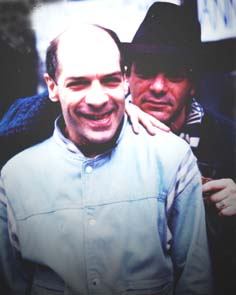Some Proposed Canadian Additionsby Rob Watkins. |
| R. W. Watkins (b. 1969)—Canadian poet, essayist and underground publisher, best known for his haiku and helping popularize the ghazal in the English language. In the mid 1980s, while still attending senior high in small-town Newfoundland, Watkins and a few friends began ditching their punk and heavy-metal regalia and attitudes in favour of retro-beat clothing and mannerisms; this served to counter 1980s mainstream fashion, entertainment and ambitions, which they saw as mired in nostalgia for the boring, supposedly innocent side of the 1950s. Their circle gradually grew to include artsy types, anarchic dropouts, young sailors, disillusioned Catholic schoolgirls and enterprising incest victims—anyone bright, talented and disaffected by mainstream culture. By the early 1990s, Watkins and most of his associates were attending post-secondary institutions throughout the Atlantic region, and their scene effectively spread out into the Grunge movement that had found a home in Canada's four easternmost provinces (with Halifax, Nova Scotia as its cultural Mecca). One by one, most of this circle has since passed away, disappeared or settled down into middle-class existence. Watkins, however, continues to write, publish and make his often-contentious views be known—although he has lived an increasingly secluded life since the mid 1990s, with his online presence ( myspace.com/rw_watkins_ghazals_haiku ) being his only major connection to the outside world. Other notable names from Watkins's circle include experimental poet Robin Tilley, singer-songwriter Kent Burt (a.k.a. The Linger Effect) and anarchist/sometimes-poet Gregory S. Young. |
R. W. Watkins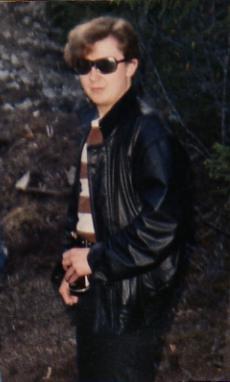
|
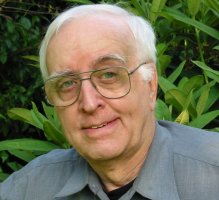 |
Don Cullen (b. 1933)—Canadian comic actor and humanist,
probably best known for his supporting roles on Wayne &
Shuster comedy specials. He was owner of the Bohemian Embassy
coffee house in Toronto, Ontario in the early to mid 1960s, where the
first official Canadian 'happening' took place in early 1963
http://archives.cbc.ca/clip.asp?IDClip=3080&IDCat=365&IDCatPa=262
|
|
Barry Baldaro, Canadian actor and comedian. He took part in the first official Canadian 'happening' at Don Cullen's Bohemian Embassy coffee house. |
Joni Mitchell, Canadian-born singer-songwriter and painter.
|
Neil
Young, Canadian-born singer-songwriter and musician.
|
Nicole Stoffmann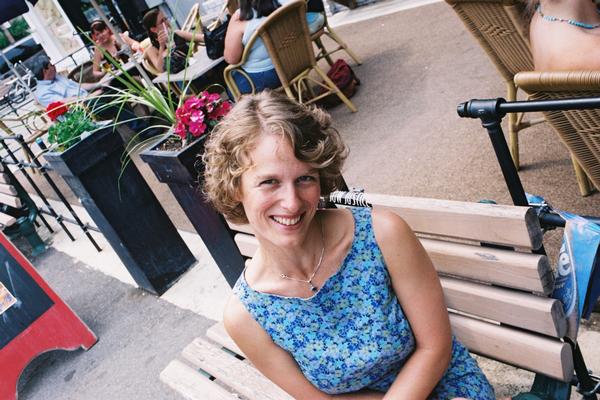
|
Nicole
Stoffmann (b. 1972), Canadian actress, jazz singer-musician and
performance artist. Stoffmann is probably best known for playing the
role of 'Stephanie Kaye' on the first two seasons of controversial
Canadian adolescents' show Degrassi Junior High in the mid to
late 1980s. Since then, she has appeared in various other television
shows and movies, and launched her career as a jazz vocalist and
guitarist with Nicole Stoffman's Jazz Boheme. In the fall of 2006,
she launched I Want Rhythm: a series of improvised dance happenings
performed throughout the streets of Toronto. More recently, she
collaborated with poet R. W. Watkins on a haibun (prose interspersed
with haiku). (Stoffman's official website:
http://www.nicolestoffman.com/
.)
|
Mordecai Richler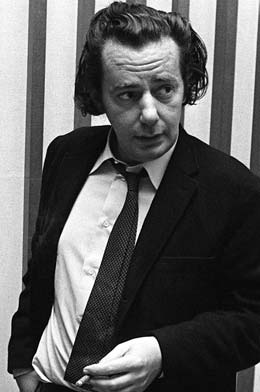
|
Mordecai Richler (1931-2001)—Canadian comic novelist, essayist and screenwriter, generally regarded as one of Canada's two or three all-time greatest authors. Often rather controversial in his approach to English-French relations in his native Quebec, as well as to his own Jewish heritage, Richler avoided the trappings of both the socially conservative Right and the politically correct Left. He started his career as a novelist while living throughout France and Spain in the early 1950s, and divided his time between Canada and England from the mid '50s to the end of his life. Three of his novels have been turned into motion pictures: The Apprenticeship of Duddy Kravitz (1958; film, 1974), Joshua Then and Now (1980; film, 1985), and St. Urbain's Horseman (1971; film, 2007). Richler received several awards for his writing, was nominated for a Best-Screenplay Oscar for The Apprenticeship of Duddy Kravitz, and—despite his curmudgeonly attitudes towards his own country—was made a Companion of the Order of Canada shortly before his rather-sudden death in the summer of 2001. |
| Irving Layton (1912-2006)—Canadian poet. Born Israel Pincu Lazarovitch to Jewish parents in Romania, he emigrated with his family to Montreal in 1913. As a teen, he joined the Young People's Socialist League (YPSL), and began reading Nietzsche and Marx, resulting in his expulsion from Baron Byng High School before graduating in 1930. Shortly after, he met A.M. Klein, with whom he developed an interest in poetry. He earned an M.A. in Economics and Political Science from McGill in 1946, and a decade later he became known as an outspoken debater on the CBC's Fighting Words television program. From that point onward, he became more and more of a 'celebrity author', publishing such critically acclaimed volumes of verse as A Red Carpet for the Sun and Lovers and Lesser Men along the way. Considering himself a Marxist for much of his early life, he later turned against the Left and came out in support of the Vietnam War--not unlike Jack Kerouac. Known for being something of a "ladies' man", he divorced and remarried frequently. He also served as Leonard Cohen's early teacher and life-long literary mentor. He died at age 93 in 2006 after a long battle with Alzheimer's disease. (Layton's Home Page, maintained by the Univeristy of Toronto: http://www.library.utoronto.ca/canpoetry/layton/index.htm ) |
Irving Layton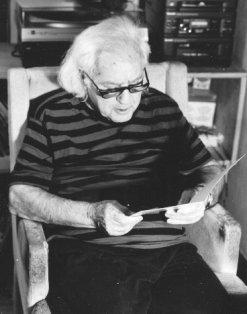
Photo by Dominika Dittwald. Copyright irvinglayton.com . |
|
Artie Gold |
Artie Gold (1947-2007)—Canadian bard associated with the Véhicule poets of Montreal. Known for his dark and rather imaginative sense of humour, he published the majority of his volumes of verse in the 1970s before prematurely 'retiring', more or less. Ill health—mostly allergies and emphysema—plagued him for most of his life, and he passed away on St. Valentine's Day, 2007. More information on Artie Gold can be found at http://www.skarwood.com/ArtieGold.htm .
|
Al Purdy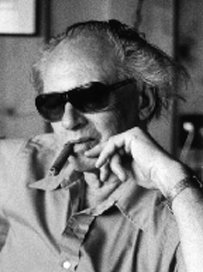 |
Al Purdy (1918-2000)Canadian poet, one of the most respected and popular that Canada has produced. Born and raised in Ontario, he served in the Royal Canadian Air Force durring World War II. Fiercely non-academic (poet-novelist Margaret Atwood once dumped a glass of beer over his head when he accused her of being "an academic"), he published such award-winning volumes as The Cariboo Horses and Collected Poems, and was eventually awarded the Order of Canada and the Order of Ontario. Purdy was a friend of Charles Bukowski, and the two corresponded for many years. Many people considered him the unofficial Poet Laureate of Canada, years before the country even adopted the practice of selecting a laureate. (Purdy's Home Page, maintained by the University of Toronto: http://www.library.utoronto.ca/canpoetry/purdy/index.htm ) |
